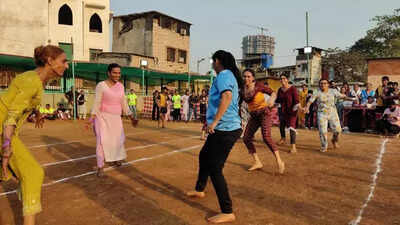Toilets to tackles: Kabaddi helps trans women break barriers – The Times of India

Tara walked to the heart of Lal Maidan, aka Deen Dayal Upadhyay playground, at Mankhurd’s Cheeta Camp, where golden trophies glinted and burqa-clad women squinted under the afternoon rays. She joined her friends, including Jasmin Khatri, in a yellowish-green salwar kameez. On Feb 25, the trans women took off their slippers to do something they hadn’t done since childhood—play kabaddi.
“We are nervous…” admitted Jasmin before her team’s match against a group of equally wary middle-aged women in blue jerseys, many of whom had not stepped outside their homes in decades, let alone played kabaddi. “We want to show that we too are women, just like them,” added Jasmin, who loves to “cook, dance, wear make-up, and feel.”
The changing room wasn’t the only shared space between the 19 trans women and 269 cis women from the surrounding slums participating in CORO India‘s unique kabaddi tournament for marginalized communities of M-East Ward. The sponsor-less event, launched by the NGO last year, aimed to break the ice between trans women and mahila mandals whose names reflected empowerment: Ran Ragini, Superwomen, Eknishtha, Dhadakebaz, Udaan.
Fifty-three of the 500-odd pay-to-use public toilets in the ward now bear posters welcoming “women, trans women, children, and people with disabilities”. Pasted in 2020, these banners came after years of advocacy. “Many toilets were built under BMC’s slum sanitation program, but there was no provision for electricity, water, or salaries for cleaning staff,” said Rohini Kadam of CORO’s Right To Pee (RTP) movement, a coalition fighting for better sanitation in Mumbai.
An RTI filed in 2012 by RTP activists revealed that only 37% of Mumbai’s 10,381 pay-to-use toilet seats were for women. By law, urinals are supposed to be free for all, yet women had no urinals, forcing those working outdoors to pay Rs 5 each time they used a toilet, cutting into their earnings. “Over 90% of working women in Mumbai are from the unorganized sector and suffer the most due to the lack of toilets,” said CORO India’s Supriya Sonar. “The problems worsen when they are menstruating.”
Some women, restricted by safety concerns or household duties, would relieve themselves into containers and empty them into gutters. The lack of electricity and cleanliness in public toilets compounded the issue. “Since there is no sanitation policy or officer in Mumbai, one has to approach multiple entities for basic provisions like electricity and maintenance,” said Kadam. CORO began training 188 local women to be ‘toilet operators’, with families paying Rs 50-150 per month for access.
Mumbadevi Kanade, a toilet operator in Govandi, faced challenges, including casteist remarks and safety threats. “It was scary, especially after 11pm, but I kept a brave face,” she said, recalling how she initially had to clean the toilets herself due to a lack of funds. “I fell sick within three months.”
Usha Deshmukh, an RTP activist, explained how kabaddi served as a tool to coax women out of their homes. “We asked them to play in the clothes they were comfortable wearing,” she said.
Among them was Usha Bhande, a 45-year-old anganwadi worker from Mankhurd, who had told her husband she was merely going to watch the match. Once in the changing room, she shed the kurti over her blue jersey and long slacks covering her knee-length shorts. “I love kabaddi,” she said, reminiscing about her childhood in Konkan, where she swam, ran, and played sports. After getting married, she hadn’t stepped outside her basti in 25 years, her only commute being to the anganwadi where she taught.
Apart from a thin partition in the changing room, the only real separation between cis and trans women was mental. “Trans women are still perceived as ‘the other’ due to stigma. There is hardly any interaction between the residents and the community. We want to create dialogue through sport,” said CORO’s Rushali Disha, a trans activist.
“We have seen them in passing but never touched them before,” said Udaan member Akshata, a 45-year-old anganwadi teacher. But over five adrenaline-filled minutes, that hesitation faded. After the match, when Udaan placed fifth, Bhande was not surprised to see her husband in the audience. Back home, after she changed into her kurti and showed him the medal, he had only one complaint: “You could have kept the jersey on.”
















